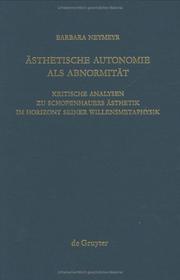| Listing 1 - 3 of 3 |
Sort by
|
Book
ISBN: 3969752426 3957432421 9783969752425 Year: 2022 Publisher: Paderborn, Germany : Brill Mentis,
Abstract | Keywords | Export | Availability | Bookmark
 Loading...
Loading...Choose an application
- Reference Manager
- EndNote
- RefWorks (Direct export to RefWorks)
Worin besteht der Unterschied zwischen dem, was ein Akteur tut, und dem, was ihm lediglich widerfährt? Den Kontrast zwischen Handlungen und bloßen Ereignissen zu erklären, ist das zentrale Problem der Handlungstheorie. Bisher gingen Philosophinnen und Philosophen stets davon aus, dass der Unterschied zwischen aktivem und passivem Verhalten allein durch Verweis auf die besonderen Produktionsbedingungen von Handlungen erklärt werden könne. Aber dies ist nicht der Fall. Die Kernthese dieser Arbeit ist, dass Handlungen nur verstanden und erklärt werden können, wenn man sowohl die produktiven als auch die inhibitorischen Aspekte von Handlungskontrolle berücksichtigt. Trotz der Bedeutung inhibitorischer Kontrolle im Alltag gibt es derzeit weder eine philosophische Auseinandersetzung damit noch einen philosophischen Ansatz, der inhibitorische Kontrolle erklären würde. Das Ziel des Buches ist es, diese Lücke in der philosophischen Forschungsliteratur zu schließen.
Handlung --- Handlungskontrolle --- Inhibition --- Willenskraft --- anarchisches Hand Syndrom --- Affordanz --- Pluralismusaction --- agency --- action control --- inhibition --- problem of action --- affordance --- anarchic hand syndrome --- inhibitory control --- Self-control. --- Inhibition. --- Act (Philosophy)

ISBN: 3110152290 3110813599 9783110152296 Year: 1996 Volume: 42 Publisher: Berlin: de Gruyter,
Abstract | Keywords | Export | Availability | Bookmark
 Loading...
Loading...Choose an application
- Reference Manager
- EndNote
- RefWorks (Direct export to RefWorks)
Schopenhauer, Arthur, --- Schopenhauer, A. --- Aesthetics. --- Schopenhauer, Arthur --- Aesthetics --- Shūpinhawar, Artūr, --- Шопенгауэр, Артур, --- Shopengauėr, Artur, --- Shu-pen-hua, --- Sopenaouer, --- Schopenhauer, Arturo, --- Schopenhauer, Artur, --- Шопенгауер, Артур, --- Shūpinhāvir, Ārtūr, --- Suʼu-pun-her, --- שאפענהויער, ארטור --- שאפענהויער, ארטור, --- שופנהאואר, ארתור, --- שופנהאואר, --- שופנהואר, ארתור --- شوپنهاور، آرتور --- شوپنهاور، أرثر --- شوپنهور، أرثر --- 叔本华, --- 叔本華, --- Schopenhauer, Arthur. --- Willensfreiheit. --- Ästhetik. --- Metaphysik --- Ästhetik --- Wille --- PHILOSOPHY / History & Surveys / General. --- Wollen --- Willenskraft --- Voluntarismus --- Künste --- Kunstästhetik --- Kunstphilosophie --- Kunsttheorie --- Philosophische Ästhetik --- Kunstanschauung --- Kunstauffassung --- Philosophie --- Ästhetizismus --- Ästhetisches Handeln --- Ästhetisches Verhalten --- Ästhetisches Ideal --- Ästhetisches Objekt --- Ästhetisches Urteil --- Prima Philosophia --- Theoretische Philosophie --- Erste Philosophie --- Metaphysikkritik --- Werden --- Ästhetik --- Theorie --- Schopenhauer, Arthur, - 1788-1860 - Aesthetics --- Schopenhauer, Arthur, - 1788-1860
Book
ISBN: 9781575063072 1575063077 1575064006 Year: 2014 Publisher: Winona Lake (Ind.) : Eisenbrauns,
Abstract | Keywords | Export | Availability | Bookmark
 Loading...
Loading...Choose an application
- Reference Manager
- EndNote
- RefWorks (Direct export to RefWorks)
"During the past century, numerous books and articles have appeared on the verbal system of Semitic languages. Thanks to the discovery of Ugaritic texts, Akkadian tablets, Canaanite letters found at Tell el-Amarna in Egypt, Hebrew and Aramaic inscriptions, and the Dead Sea Scrolls, our understanding of the phonology, morphology, and syntax of the Semitic languages has increased substantially. Dallaire focuses primarily on prose texts in Biblical Hebrew and Amarna Canaanite in which the verbal system (morphemes, syntax) expresses nuances of wishes, desires, requests, and commands. According to her, volitional concepts are found in every language and are expressed through verbal morphemes, syntagmas, intonation, syntax, and other linguistic means. The Syntax of Volitives in biblical Hebrew and Amarna Canaanite prose attempts to answer the following questions: do volitives function in a similar way in biblical Hebrew and Amarna Canaanite? Where and why is there overlap in morphology and syntax between these two languages? What morphological and syntactical differences exist between the volitional expressions of the languages? In attempting to answer these questions, the author bears in mind the fact that, within each of these two languages, scribes from different areas used specific dialectal and scribal traditions (for example, northern versus southern, peripheral versus central)" -- summary
22.02*1 --- 22.02*1 Bijbelse filologie: hebreeuws --- Bijbelse filologie: hebreeuws --- Tell el-Amarna tablets. --- Amarna letters --- Lettere di el-Amarna --- Amarna Letters from Canaan --- El-Amarna correspendence --- Hebrew language --- Canaanite language --- Hébreu (Langue) --- Cananéen (Langue) --- Grammar --- Verb. --- Verb --- Grammaire --- Verbe --- Wollen --- Tontafel --- Hebräisch --- Semitic languages, Northwest --- Syriac language, Palestinian --- Jewish language --- Jews --- Grammar, Comparative --- Canaanite language. --- Languages --- Amarna --- Centro para la Promoción de la Conservación del Suelo y del Agua --- PROSA --- Buenos Aires --- Althebräisch --- Biblisches Hebräisch --- Bibelhebräisch --- Alttestamentliches Hebräisch --- Klassisches Hebräisch --- Biblisch-hebräisch --- Kanaanäische Sprachen --- Jüdische Sprachen --- Hebraistik --- Tafel --- Beschreibstoff --- Verbum --- Zeitwort --- Verbalsystem --- Tunwort --- Verben --- Volition --- Volitionale Kompetenz --- Wille --- Willenskraft --- Tablettes cunéiformes --- Cananéen (langue) ancien --- Grammaire comparée --- Hébreu (langue).
| Listing 1 - 3 of 3 |
Sort by
|

 Search
Search Feedback
Feedback About UniCat
About UniCat  Help
Help News
News